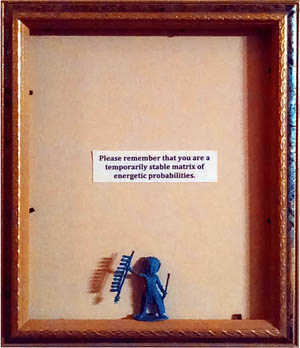 On a recent flight home to San Francisco, circumstances conspired to inspire me to contemplate the meaning of a phrase that has lingered throughout my writing: Argue Naked. In order for inspiration to possess me, however, I first had to experience what the history of all human dignity must surely deem the supreme superlative of airplane discomfort. I’ve relegated the earlier details of that airborne nightmare to another essay, so this essay begins near the end of that ghastly flight, after I’d finally won some comfort, and upon awakening from a desiccant nap.
On a recent flight home to San Francisco, circumstances conspired to inspire me to contemplate the meaning of a phrase that has lingered throughout my writing: Argue Naked. In order for inspiration to possess me, however, I first had to experience what the history of all human dignity must surely deem the supreme superlative of airplane discomfort. I’ve relegated the earlier details of that airborne nightmare to another essay, so this essay begins near the end of that ghastly flight, after I’d finally won some comfort, and upon awakening from a desiccant nap.
Bafflingly, his view screen was broadcasting a man and a woman—stark naked the both of them—tearing around the woods on an ATV.Dehydration beckoned me awake, and lifting my eyeshades, the first thing I discovered was the view screen on the seatback in front of the pasty young fellow next to me. Bafflingly, his view screen was broadcasting a man and a woman—stark naked the both of them—tearing around the woods on an ATV. Their genitals and her breasts were dutifully pixelated, although their asses were on unabashed display, emphasizing, perhaps, how asinine was their circumstance. Unable to avert my eyes from this ridiculous scenario, I intermittently viewed it along with the pasty young fellow next to me. I even considered fishing my headphones out and tuning in my own view screen to this breathtaking prolefeed, but I ultimately decided against inviting any soft-core camaraderie with my pasty seatmate. In any event, I eventually discerned that he was watching a VH1 “reality” show called Dating Naked, although here—by way of circuitously coming around to the theme of this essay—I must submit that this wang-dangling, mass-mediated idiotism ought properly be called Dating Nude. Running around starkers, after all, pretending banks of cameras manned by newly-minted douchebags aren’t watching your every move is bound to inspire an unfathomable self-consciousness, as the nude dude inadvertently demonstrated when he was unable to resist a couple of desperate tugs upon his pixelated but presumably bashful penis. Such a voyeuristic circumstance can only inspire mortified exhibitionism from its participants, not the Edenic vulnerability that nakedness implies.
So, let’s examine this phrase: Argue Naked. Originally intended as an ludicrous imperative, the phrase first found a place upon my lips as an unpremeditated toast at my sister’s wedding. It earned a decent laugh, and I consequently integrated the phrase into a brief scene in my first novel, Just a Couple of Days, and later on into my second novel, Nine Kinds of Naked, as a means of linking them into the same fictional universe. Ultimately, I included yet another Argue Naked leitmotif in an early scene in my third novel, Love and Other Pranks. Quite unintentionally, it seems, I had written the Argue Naked trilogy.
Originally, the gymnosophists were a sect of 4th century Jainist philosophers who regarded clothing as detrimental to the purity of their thought.Moreover, shortly after the release of my second novel, a reader alerted me to a recent Comedy Central special by self-described blue-collar comedian Bill Engvall featuring a brief segment about how crazy and controlling his wife is. The segment was called—yes it was—Argue Naked, although he pronounced it nekkid. Clearly, this was an idea whose time had come, except that it turns out this was never a new idea in the first place. Argue Naked would perhaps never have graduated from its status as an oxymoronic toast had I not happened across a word one day while browsing the dictionary: gymnosophy, which literally means “naked philosophy.” Originally, the gymnosophists were a sect of 4th century Jainist philosophers who regarded clothing as detrimental to the purity of their thought – and a group of whom, incidentally, once even outwitted Alexander the Great. Notably, gymnosophy shares the same root as gymnasium, which in its ancient Greek meaning referred to naked exercise, a practice that has obviously been abandoned in the gymnasiums of our public schools and probably only survives in certain fringe yoga classes in the San Francisco Bay Area.
Etymology aside, I continued to contemplate the concept of gymnosophy, if only on an allegorical level. As I pointed out in Nine Kinds of Naked, whereas nudity implies a sort of garish confidence and inescapable exhibitionism, nakedness implies an Edenic vulnerability, a deprivation of all defense and disguise. Nobody ever says that Adam and Eve were nude, in other words. Adam and Eve were naked, and nakedness is not the same as nudity. A stripper, for example, may be entirely nude, but with a deeply disguised heart, while a person in love may be fully clothed, but with a naked, undefended heart. As I think the early gymnosophists realized, defense and pretense are precisely what precipitate and perpetuate arguments in the first place, and truth—like love—cannot be known in the absence of vulnerability.
 Incidentally, the Jainist philosophers were not alone in their gymnosophical explorations. The ancient Greek Cynic philosophers as well were known to occasionally expound upon their ideas without the detriment of clothing. Like their contemporary Jainists, the Cynics sought to abandon social convention and the various repressions it enforced by dispensing with their apparel. The philosopher Diogenes, for example, lived in something resembling a tub and was frequently seen stalking naked about the streets of Athens carrying a lantern in broad daylight. When asked what he was doing, he would respond that he was looking for an honest man.
Incidentally, the Jainist philosophers were not alone in their gymnosophical explorations. The ancient Greek Cynic philosophers as well were known to occasionally expound upon their ideas without the detriment of clothing. Like their contemporary Jainists, the Cynics sought to abandon social convention and the various repressions it enforced by dispensing with their apparel. The philosopher Diogenes, for example, lived in something resembling a tub and was frequently seen stalking naked about the streets of Athens carrying a lantern in broad daylight. When asked what he was doing, he would respond that he was looking for an honest man.
Predictably, history has not been kind to the ideas of Cynicism. Like feminism, a more recently politically-unpopular set of ideas, the true breadth of the philosophy of Cynicism has been narrowed and misrepresented into a more easily dismissed straw man. Thus, feminists become man-haters and Cynics become, at worst, dishonest and knifing, as in cynical politicians. Ironically, though, this sense of the word is precisely what the Cynics were condemning, which is rather like imagining that one day feminism will mean the disenfranchisement of women. Even in its least pejorative connotation today, cynicism is simply negative, as in “don’t be so cynical,” – a cardinal sin in latter-day West Coast New Age woowoo culture.
To a Cynic, true happiness is achieved by living a simple life largely free from the desire for influence and social standing.In its original conception, Cynicism referred to a disbelief in the sincerity or goodness of human motives and actions. At first glance, this certainly sounds negative, but it turns out that there is more to the philosophy than that misanthropic half-proposition. Cynicism goes on to specify this disbelief in the sincerity or goodness of human motives and actions specifically when motivated by the desires for wealth, power, sex, and reputation. In other words, it is the competitive self-interest spawned by antisocial social structures that corrupts the fundamental virtue of human nature by fastening upon us such unnatural ambitions. To a Cynic, true happiness is achieved by living a simple life largely free from the desire for influence and social standing, and there’s neither a Buddhist monk nor an early Christian who could argue naked with that.
It turns out, by the way, that Alexander the Great was keen on naked philosophers. In addition to debating the Jainist gymnosophers during his adventures in India, he was also known to have sought out Diogenes back home in Greece. During their exchange, Diogenes was distracted from their conversation by a pile of human bones, and began to pick through them. When Alexander demanded to know what he thought he was doing, Diogenes replied that he was looking for the bones of Alexander’s father, but alas, he could not distinguish them from those of a slave.
 And this, I think, points to the deepest meaning of Argue Naked. To Argue Naked means to abandon all pretense at who we think we are or who we wish to be, to remember that we are nothing more than temporarily stable matrices of energetic probabilities lost in a terrifyingly infinite universe. Naturally, such gnosis is nowhere to be found in the language of our modern world – and least of all in the language of an argument. The promise of language becomes little more than a medium for deception as advertisers use language to con the self-esteem of consumers, as businessmen use language to swindle greater profits, as politicians use language to demagogue the masses, as siblings and spouses use language to disown their own shadows, as friends use language to compete for petty status, and even as so-called yogis weaponize a spiritual vocabulary in order to mask their second chakra motivations, and it’s all just another day in the lie – I mean, life.
And this, I think, points to the deepest meaning of Argue Naked. To Argue Naked means to abandon all pretense at who we think we are or who we wish to be, to remember that we are nothing more than temporarily stable matrices of energetic probabilities lost in a terrifyingly infinite universe. Naturally, such gnosis is nowhere to be found in the language of our modern world – and least of all in the language of an argument. The promise of language becomes little more than a medium for deception as advertisers use language to con the self-esteem of consumers, as businessmen use language to swindle greater profits, as politicians use language to demagogue the masses, as siblings and spouses use language to disown their own shadows, as friends use language to compete for petty status, and even as so-called yogis weaponize a spiritual vocabulary in order to mask their second chakra motivations, and it’s all just another day in the lie – I mean, life.
But consider: In the absence of trying to win or achieve some goal, in the absence of endeavoring to fit in with a group, and in the absence of merely broadcasting a preferred self-image, we are left with true communication, a sharing of points of view oriented only to the discovery of truth, and a truth that is invariably indistinguishable from love. Inhabiting such a space with one another, it becomes impossible not to realize that communication shares the same root as communion, and that communication—properly conducted—can only reveal our indivisible unity.
And so, if I may echo Dylan’s thief who kindly spoke, “Let us not talk falsely now,” let us bare our hearts and Argue Naked, and let all of our arguments fall away, like so much clothing before love.
And may you be ever overwhelmed by how many people you love,
Leave a Reply
You must be logged in to post a comment.